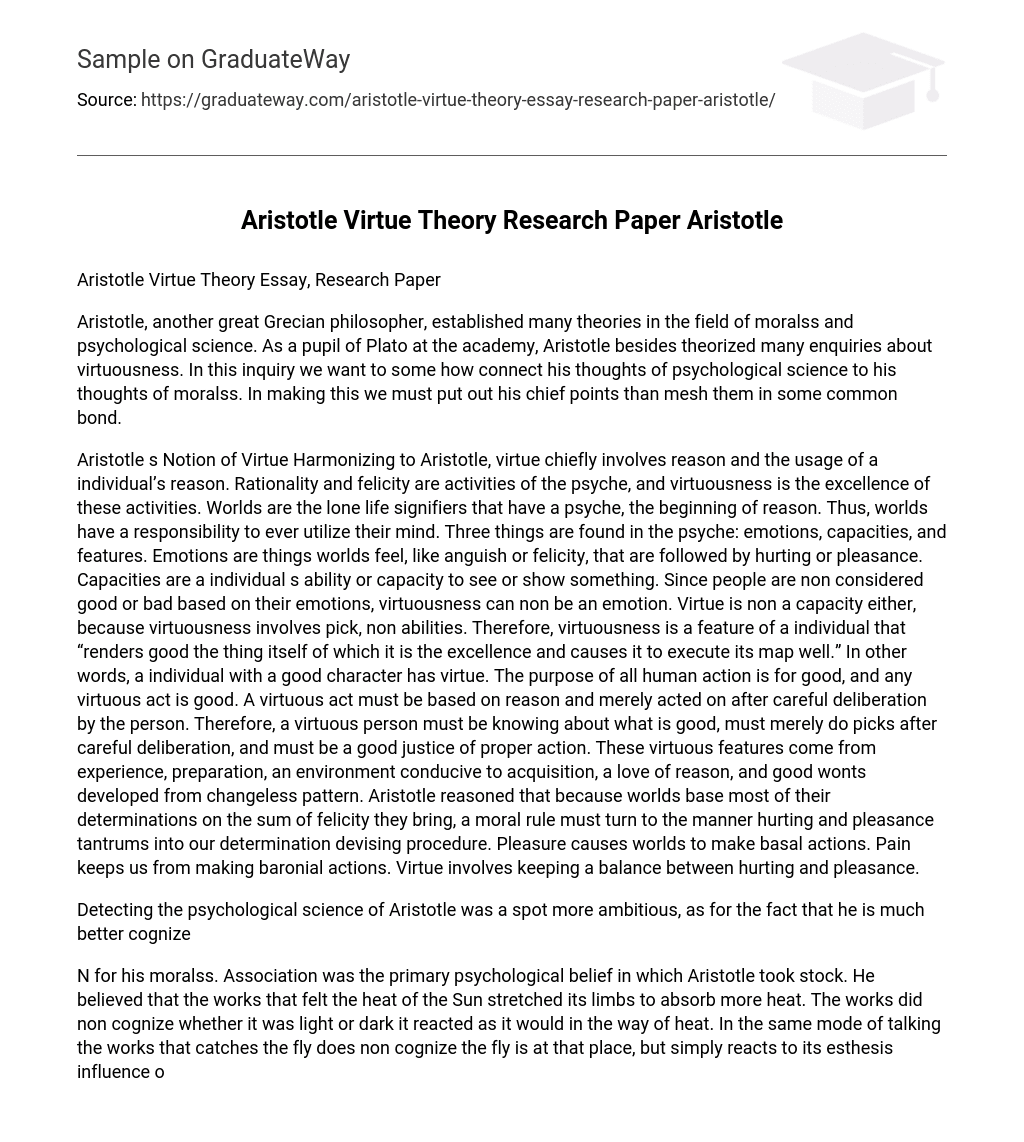Aristotle, another great Grecian philosopher, established many theories in the field of moralss and psychological science. As a pupil of Plato at the academy, Aristotle besides theorized many enquiries about virtuousness. In this inquiry we want to some how connect his thoughts of psychological science to his thoughts of moralss. In making this we must put out his chief points than mesh them in some common bond.
Aristotle s Notion of Virtue Harmonizing to Aristotle, virtue chiefly involves reason and the usage of a individual’s reason. Rationality and felicity are activities of the psyche, and virtuousness is the excellence of these activities. Worlds are the lone life signifiers that have a psyche, the beginning of reason. Thus, worlds have a responsibility to ever utilize their mind. Three things are found in the psyche: emotions, capacities, and features. Emotions are things worlds feel, like anguish or felicity, that are followed by hurting or pleasance. Capacities are a individual s ability or capacity to see or show something. Since people are non considered good or bad based on their emotions, virtuousness can non be an emotion.
Virtue is non a capacity either, because virtuousness involves pick, non abilities. Therefore, virtuousness is a feature of a individual that “renders good the thing itself of which it is the excellence and causes it to execute its map well.” In other words, a individual with a good character has virtue. The purpose of all human action is for good, and any virtuous act is good. A virtuous act must be based on reason and merely acted on after careful deliberation by the person. Therefore, a virtuous person must be knowing about what is good, must merely do picks after careful deliberation, and must be a good justice of proper action. These virtuous features come from experience, preparation, an environment conducive to acquisition, a love of reason, and good wonts developed from changeless pattern. Aristotle reasoned that because worlds base most of their determinations on the sum of felicity they bring, a moral rule must turn to the manner hurting and pleasance tantrums into our determination devising procedure. Pleasure causes worlds to make basal actions. Pain keeps us from making baronial actions. Virtue involves keeping a balance between hurting and pleasance.
Detecting the psychological science of Aristotle was a spot more ambitious, as for the fact that he is much better cognize
N for his moralss. Association was the primary psychological belief in which Aristotle took stock. He believed that the works that felt the heat of the Sun stretched its limbs to absorb more heat. The works did non cognize whether it was light or dark it reacted as it would in the way of heat. In the same mode of talking the works that catches the fly does non cognize the fly is at that place, but simply reacts to its esthesis influence on the tips of the cilia of their foliages. Aristotle distinguishes us from animate beings in our ability to ground, which has been disputed in current times. He besides dabbles in our human make-up and separates the organic structure as a tool for the spirit. Our moralss come from the spirit as our organic structures may be considered animalistic.
The relationship between Aristotle s moralss and his psychological science are non every bit obvious as the differences. Aristotle has been criticized for believing up theories that struggle his basic theories, but one who thinks invariably can non be held back by one s ain ideas. As we know by this point we are all seeking to derive felicity through being a good individual. A individual of virtuousness. As for the connexion, another trouble arises, I believe that the workss and animate beings without ground do certain activities to break themselves and do themselves happier. If they are without ground so their activities are non thought out and at that place forward instinctual or might I say subconsciously done. So how can be if he specifically demands that being cognizant of your actions is the true way to virtue? This is my lone connexion an anti-connection.
In current intelligence we find that the old issues have been greatly adopted throughout society. In the most common ethical issues we find this same quandary. Abortion, a common job, trades with moralss vs. psychological science at a ne’er stoping gait and is normally the spliting line between many people who would ne’er be in struggle with each other. The moralss of it is obvious; the violent death of a babe is non virtuous and non right. The devastation of a immature adult female is non virtuous or right either. The psychological science of worlds and our cardinal inclinations make us propagate and desire to prosecute in sex. That is right and virtuous yet non moral at all clip. This leads to the possibility of gestation which leads to our witting pick of whether to abort a gestation or non. The turn are unending and although I feel I have a good appreciation on this it slips off as I make my descent.





